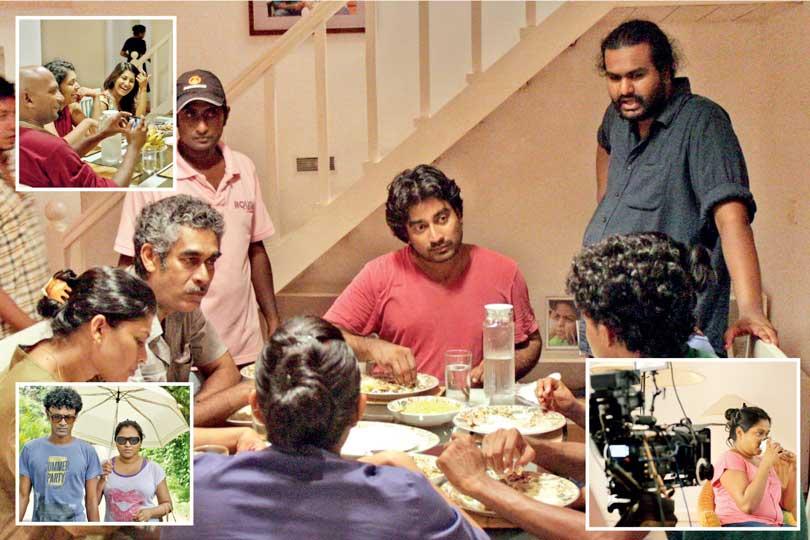Reply To:
Name - Reply Comment
Last Updated : 2024-04-25 00:00:00

 We see Dinithi in close-up almost all the time, yet she seems distanced from us. The action is limited to the interiors, and Dinithi does what little she can inside the house. But then even something as innocuous as a telephone conversation has to be muffled. (In the first few scenes we see her from behind a latticed wall when she’s talking over the phone.) We realise there’s something wrong in this family, and we speculate: the husband is carrying on an affair; the husband has reached a point where he’s incapable of responding to her; the pressures and cosmetics of middle class life have taken their toll on this urban middle class couple.
We see Dinithi in close-up almost all the time, yet she seems distanced from us. The action is limited to the interiors, and Dinithi does what little she can inside the house. But then even something as innocuous as a telephone conversation has to be muffled. (In the first few scenes we see her from behind a latticed wall when she’s talking over the phone.) We realise there’s something wrong in this family, and we speculate: the husband is carrying on an affair; the husband has reached a point where he’s incapable of responding to her; the pressures and cosmetics of middle class life have taken their toll on this urban middle class couple.
In the hands of another director, these may have been the themes of the story. But Malith Hegoda tones down and opts for a different, simpler plot line: the infidelity of the wife. It’s a theme rife with possibility, with drama, with action, but to Hegoda’s credit, he instead forces us to grapple with its wider implications. Hegoda does not try to glorify one party over another: there is no room for denouements (though Dinithi seems to wish for one). With that he ensnares us in: it’s neither straightforward, nor complicated. In other words, married life in a nutshell.
Dekala Purudu Kenek, despite its many flaws, is a work of searing honesty. It takes on a theme that Sinhala playwrights, even the more serious ones, keep on tackling every year. All of them – including the most recent, Rajitha Dissanayake’s Hithala Gaththu Theeranayak – conforms to the usual pattern: the unfaithful husband harping on about his fidelity to his marriage, the wife discovering the existence of “the other woman”, the other woman coming out, and the husband being redeemed in the eyes of his wife. Dekala Purudu Kenek turns the table on this because the centre of the plot here is the woman: Samadhi Laksiri, wife to a philosophising womaniser in Rajitha’s play, is in Hegoda’s film wife to a jealous, brutal, inexplicably anodyne man.
I won’t explain the plot, partly because it’s available online and partly because there’s nothing much of a plot in the first place. (The director has, within the confines of such a story, the advantage of economy: he can bring out the dramatic in the un-dramatic, and unearth action, conflict, and resolution from silence.) This is not the first time that someone has tackled the breakdown of a marriage in a local film and it will not be the last. But it is to the credit of Hegoda and the writer, Boopathy Nalin Wickramage, that they try (to do) something different here.
In Rajitha’s play, the protagonist – the unfaithful husband – has the luxury of someone to listen to him: a friend from work who’s also unfaithful to his wife. The protagonist is honest: once he’s caught, he confesses. For him, it’s a principle; for the friend, it’s a modakamak. “Machang,” he tells him, “You shouldn’t be truthful with these matters. I mean, look at me. Whenever my wife asks me if I love her, I use every superlative on earth to say that yes, I do.” But these are men, and being men they can indulge in such grandiloquent gestures; there’s room for comedy. Hegoda’s film, on the other hand, shows us that such flippant gestures would not crop up at all, even in a work of art, if it were a question of a woman’s fidelity.
But then it would be grossly unbecoming on my part as a writer to suggest that all Hegoda does is to condemn the man and exculpate the wife. Like Rajitha’s plays, his film revolves around a narrow canvas: the husband, the wife, her sister, her cousin, the trishaw driver, and a little later, the concerned parents.
They have their debates, they condemn one party over the other, yet even when their disagreements reach boiling point, Hegoda ensures that we don’t take sides. Dinithi is as much to blame for the debacle as her husband, Sachitra and Sachithra has a spark of humanity that glimmers here and there. The difference is one of degree: who was responsible for the breakdown, and was the response of the other side proportionate? We know the answer to the first; to the second, not so.
Here the cast stands out. Samadhi Laksiri is convincing as the soft-spoken, stout, sensitive wife who has to tone down her voice even when her husband domineers over her; Bimal Jayakody is rather unremarkable and hard to understand as Sachitra; Jagath Manuwarna plays witness to the drama in the house (although we never get the fight between him and Sachitra that a more popular film would have offered); and Chamila Peiris, Lakshman Mendis, Kaushalya Fernando, and Dayadeva Edirisinghe show up their prejudices as the parents. (Mendis’s performance as Dinithi’s father proves yet again that he is an actor of almost Lincolnesque potential.)
In most “conventional” movies, sex, or at least tenderness, is enough: it’s the magic antidote that resolves conflict. The suddenness of the lovemaking in Dekala Purudu Kenek Based on the responses to it by people I know, I can say that the film has succeeded in polarising audiences, as any film of this sort SHOULD. Sachitra restricts her even more by sealing the telephone in a box). This is what the classic continental directors, from Antonioni to Bergman and beyond, questioned: the potential of sex as a liberator.
Even if one faults him over the way he filmed these sequences – abrupt (which was only natural in the way the plot was evolving at that point), crude (which would imply that sex can be prettified when it cannot in a film like this), and unimaginative (which I think it was: why film makers can’t shoot such scenes differently, I can’t tell), one has to understand that this is not the biggest flaw in the objet d’art. Dekala Purudu Kenek left me with answers, and it also left me with questions.
Based on the responses to it by people I know, I can say that the film has succeeded in polarising audiences, as any film of this sort should. But the question to be asked is whether audiences have been put off by the content of the story, or the techniques that have been used to project its themes. I think it’s the latter, since a significant number of people complain that the film drags on, with repetitions that are unwarranted and plot-holes that are never explained.
It’s the same problem I saw with Asoka Handagama’s Age Asa Aga, a film that in the press never got the drubbing (it should have) that it received from the critics on social media: while there’s much symbolism to wade through, we have to rely on ancillary texts, like the review of a scholarly critic, for us to understand it.
For instance, what is the purpose of that mug which Dinithi drinks from? (Why does she hide it from her husband?) And why are we constantly reminded that Sachitra is Catholic (a problem I had even in the old classics: why, for instance, is Miranda from Hansa Vilak Catholic – because middle class Buddhists are loyal in their marriages, and because when they discover the infidelity of their spouses they don’t unleash their fury the way Sachitra does?). Intentionally or otherwise, Hegoda and Boopathy cave into the tropes of the typical Sri Lankan art house film, as much as Rajitha resorts to the props of middle-class desiderata in his plays.
Had the plot been shorter (at over two hours, to say it was long for this particular kind of story would be to understate my feelings), had we got lengthier sequences for those episodes which didn’t make sense even at the end, and had we got more involved with the characters, without being treated to, say, the same sequence of the husband making scenes, picking up fights, and coming close to assaulting the wife, the plot would have gained in flesh what it loses it elongation.
That is not to say there weren’t scenes and shots that didn’t work: the power outages at night, the husband (an architect) harping on about how good it is for a house to have just one entrance, and the car accident that, for one moment at least, brings the two of them together. The latter specifically had us clamouring for a resolution of some sort. Had there been a resolution, we would have left the hall as happier people. But there isn’t one. And the way Hegoda and Boopathy ensure that there isn’t one is, I think, the greatest strength in Dekala Purudu Kenek. That alone is enough to elevate this work, and to compensate for (almost all) its flaws and inadequacies.
UDAKDEV1@GMAIL.COM

Add comment
Comments will be edited (grammar, spelling and slang) and authorized at the discretion of Daily Mirror online. The website also has the right not to publish selected comments.
Reply To:
Name - Reply Comment
US authorities are currently reviewing the manifest of every cargo aboard MV
On March 26, a couple arriving from Thailand was arrested with 88 live animal
According to villagers from Naula-Moragolla out of 105 families 80 can afford
Is the situation in Sri Lanka so grim that locals harbour hope that they coul